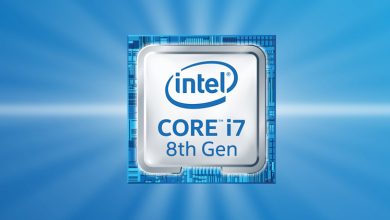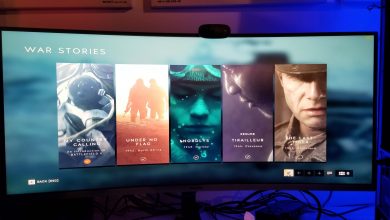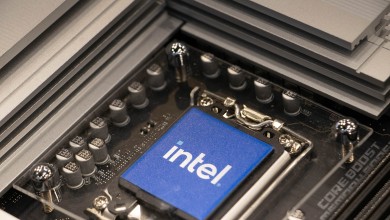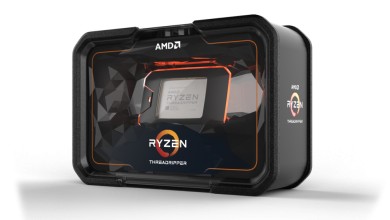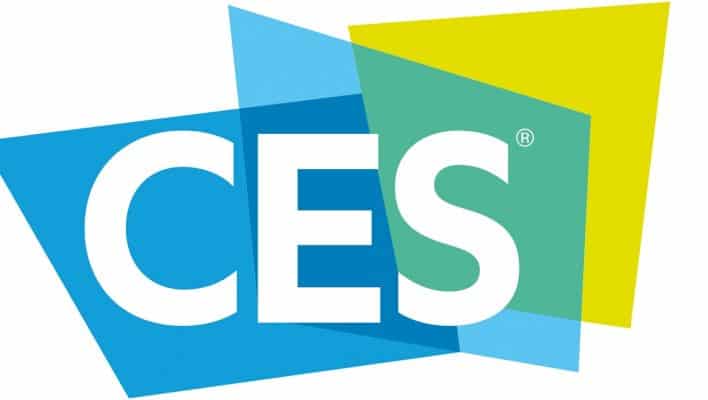
AMD
By far the most anticipated press release of the day, and AMD did not disappoint.
4th Gen Ryzen is out on gaming laptops
The highlight of AMD’s CES 2020 key note for sure.
Developed for ultra-thin mobile devices (i.e: tablets or laptops), the AMD Ryzen Mobile 4000 series is based on the same Zen2 architecture, 7nm manufacturing process than seen on the AMD Ryzen Desktop 3000 series.
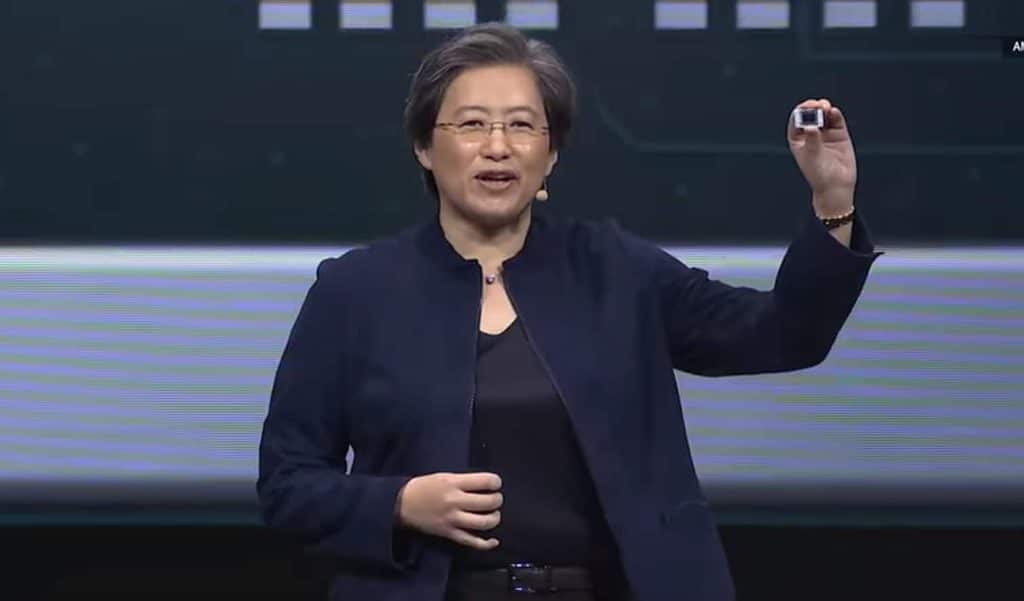
It is coupled with a VEGA based optimized APU (59% performance gained claimed), available in different video core count
AMD latest mobile-centric CPU will see 9 Mobile CPUs divided in 3 new series :
- U-Series : for ultrathin consumer laptops. Limited CPU power, but extreme battery longivity
- H- Series : for gaming and creators laptops, balancing battery efficiency and power when powerd on AC.
- Pro-Series: for ultrathin professional laptops, for mobile video editing and 3D works.
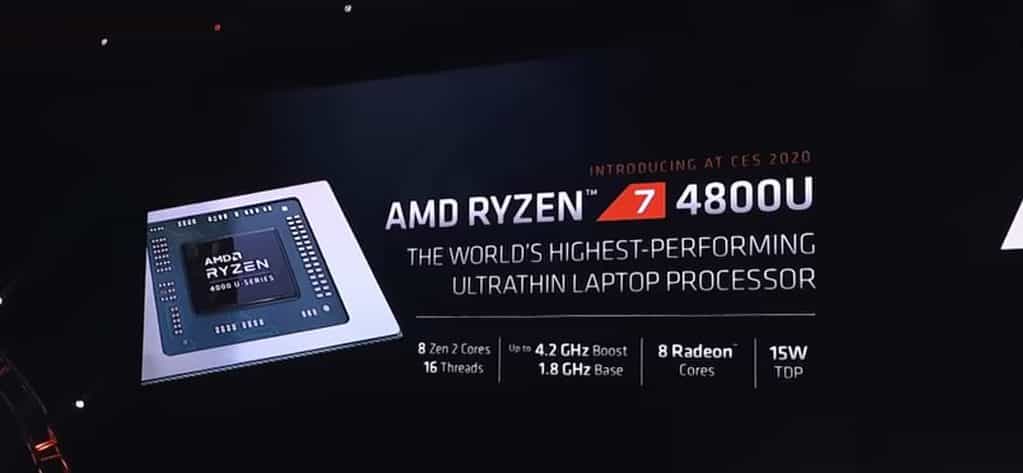
AMD RYZEN 7 4800H :
- 8 zen2 cores for 16 threads
- 4.2 GHz boost clock for 2.9 GHz base clock
- 7 Radeon Cores (or video units)
- 12 MB Memory
- 45 W TDP
AMD RYZEN 5 4600H :
- 6 zen2 cores for 12 threads
- 4.0 GHz boost clock for 3.0 GHz base clock
- 6 Radeon Cores (or video units)
- 11 MB memory
- 45 W TDP
AMD RYZEN 7 4800U :
- 8 zen2 cores for 16 threads
- 4.2 GHz boost clock for 1.8 GHz base clock
- 8 Radeon Cores (or video units)
- 12 MB Memory
- 15 W TDP
AMD RYZEN 7 4700U :
- 8 zen2 cores for 8 threads
- 4.1 GHz boost clock for 2.0 GHz base clock
- 7 Radeon Cores (or video units)
- 12 MB Memory
- 15 W TDP
AMD RYZEN 5 4600U :
- 8 zen2 cores for 16 threads
- 4.0 GHz boost clock for 2.1 GHz base clock
- 6 Radeon Cores (or video units)
- 11 MB Memory
- 15 W TDP
AMD RYZEN 5 4500U :
- 6 zen2 cores for 6 threads
- 4.0 GHz boost clock for 2.3 GHz base clock
- 6 Radeon Cores (or video units)
- 11 MB Memory
- 15 W TDP
AMD RYZEN 3 4300U :
- 4 zen2 cores for 4 threads
- 3.7 GHz boost clock for 2.7 GHz base clock
- 5 Radeon Cores (or video units)
- 6 MB Memory
- 15 W TDP
AMD Athlon Gold 3150U :
- 2 zen2 cores for 4 threads
- 3.3 GHz boost clock for 2.4 GHz base clock
- 3 Radeon Cores (or video units)
- 5 MB Memory
- 15 W TDP
AMD Athlon Silver 3050U :
- 2 zen2 cores for 2 threads
- 3.2 GHz boost clock for 2.3 GHz base clock
- 2 Radeon Cores (or video units)
- 5 MB Memory
- 15 W TDP
What is truly remarkable is the low consumption abilities of these chips compared to their advertised specs and performances.
AMD is going head-to-head against Intel 10th gen. mobile Processors, almost bullying them in aggressive index comparison!
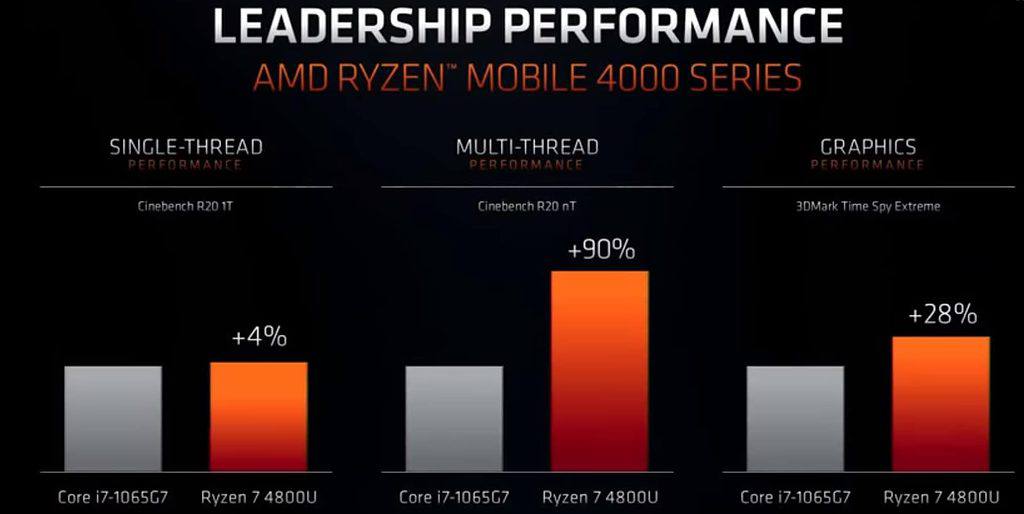
And the number are not kind to Intel.
We should be able to see the first Ryzen Mobile CPU 4000 equipped laptop hitting the market in the next few weeks, with no pricing details thus far.
Threadripper 3990X , 64 Cores / 128 threads, 288 MB cache memory
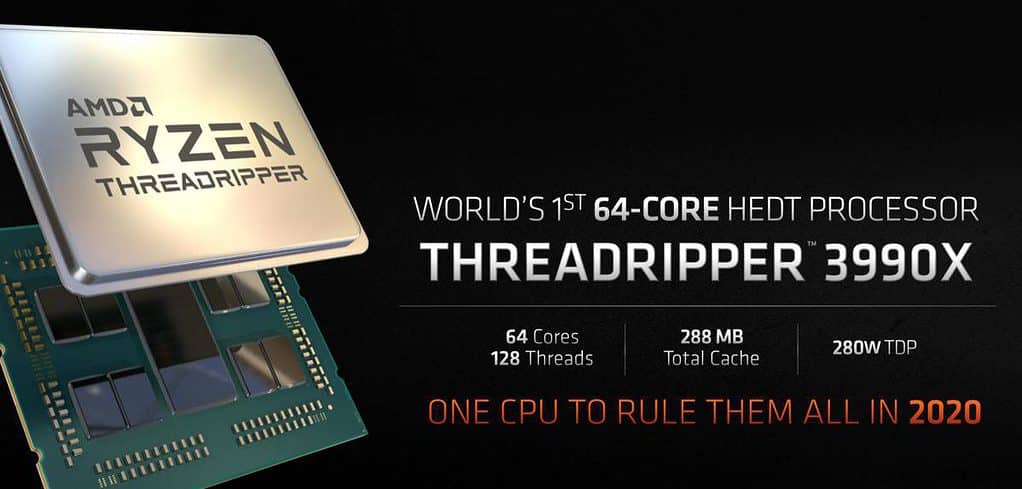
As anticipated, AMD has announce the launch a additional 3rd Gen Threadripper Processors, available in stores on the 7th of February:
The Threadripper 3990X
64 Cores / 128 Threads / 288 MB memory Cache (L1+L2+L3).
4.3 GHz Boost Clock
2.9 GHz Base Clock
After the launch of the TRX40 chipset and its latest PCIE 4.0 / 7nm 3rd Gen Threadripper Processors, AMD had teased much higher core count than currently available.
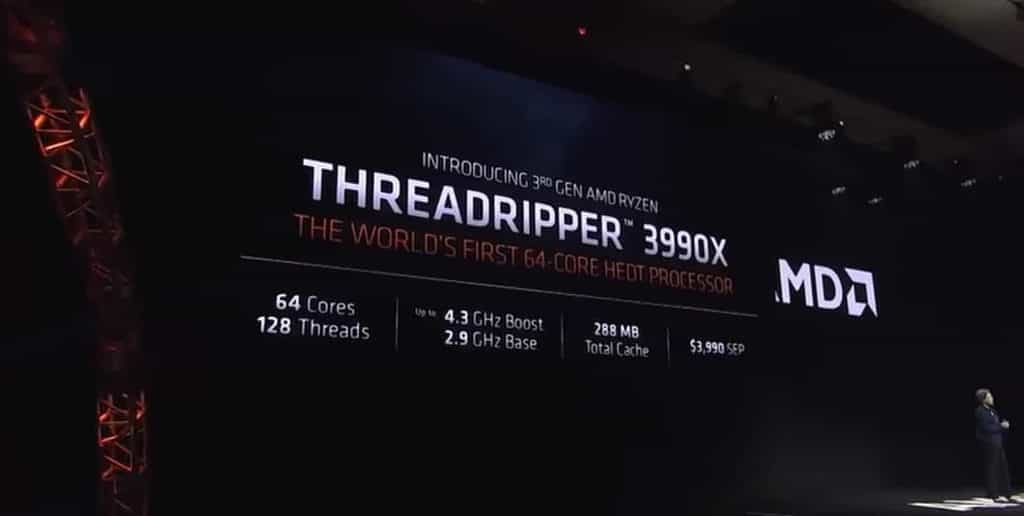
And without much surprise, AMD confirmed the release of a 64 cores / 128 threads.
Though welcomed by gasps and excited grunts from the public, these processors will be limited to the very few. The price tag of this over-cored monsters put it far from the reach of any computer enthusiasts.
We are talking $3,990 SEP for the Threadripper 3990X.
Noticed absent of the Threadripper Key-note is the equally anticipated and rumored Threadripper 3980X, 48 cores, 96 threads.
Radeon RX 5600 XT
AMD announces the Radeon RX 5600 XT disrupt and dominate 1080p gaming! It has the merit to be both focused and clear!We had a RX 5700, we had a RX 5500, it was natural to expect a RX 5600.
AMD made it crystal clear. If you are looking for THE 1080p 60 fps card, this is where you money needs to be!
The Specs
The RX 5600 XT is based on the same architecture, RDNA, than the 5500 and 5700 cards. It has 36 compute units clocked up to 1,560 MHz, with a consistent 1,375 MHz Game Clock. It will rely on 6GB of GDDR6 VRAM.
Show casing its 1080p abilities, AMD shoed off 5600 XT’s 92 fps for Call of Duty: Modenr Warfare, 87 fps on Gears of Wars 5 an 88 fps on Division 2. They all beat Nvidia GeForce GTX 1660 Ti by an healthy margin, at the very recommended price : $279, availalbe on January 21st.
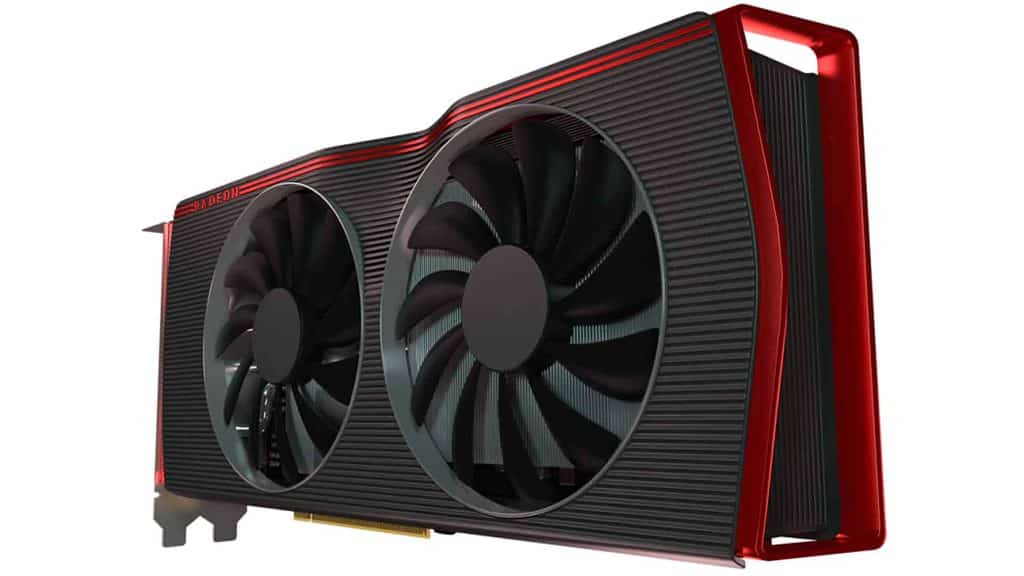
There will be a mobile version of the card RX 5600M as well as a beefier RX 5700M, announced for Q1 / Q2 2020.
These will undoubtedly provide an healthy gaming and production incentive for any new Ryzen Mobile 4000 based product purchase.
Here a small specs comparison
| GPU | Compute Units | Stream Processors | TFLOPs | Game Clock | Max Boost Clock | Memory | Memory Interface |
|---|---|---|---|---|---|---|---|
| RX 5500 XT | 22 | 1408 | 5.2 | 1717MHz | 1845MHz | 4GB / 8GB GDDR6 | 128-bit |
| RX 5600 | 32 | 2048 | 6.39 | 1375MHz | 1560MHz | 6GB GDDR6 | 192-bit |
| RX 5600 XT | 36 | 2304 | 7.19 | 1375MHz | 1560MHz | 6GB GDDR6 | 192-bit |
| RX 5700 | 36 | 2304 | 7.95 | 1625MHz | 1725MHz | 8GB GDDR6 | 256-bit |
| RX 5700 XT | 50 | 2560 | 9.75 | 1755MHz | 1905MHz | 8GB GDDR6 | 256-bit |
Intel
Well, to be clear, Intel’s Keynote took place shortly after AMD’s. There was some expectations regarding last week’s Informatica Cero leak, which disclosed the detailed specs of the incoming Intels Desktop CPU 10th gen Core series and it chipset, the Z490.
Instead, Intel failed to give anything substantive along its key-note, merely updating the industry on its Anthena Poject, its 10th Gen mobile abilities (announces and released shortly after CES 2019), a very short tease of the next gen CPU line-up codenamed Tiger Lake, and some demo of its not-to-soon-to-come GPU architecture codenamed DG1.
In contrast with AMD’s hard deliveries and concrete announcement, Intel fails to excite and you can tell throughout the key note.
Project ATHENA
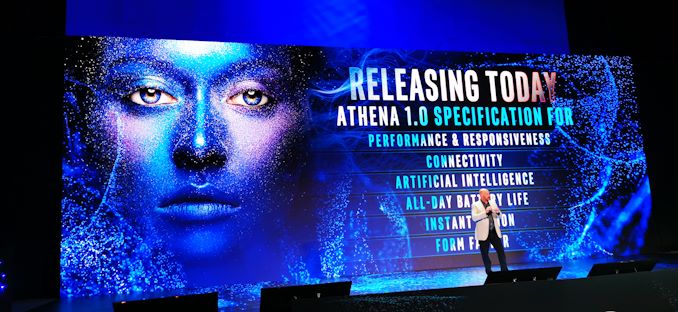
It is Intel’s initiative to certify OEM ultra thin laptops in accordance with Project’s Athena’s ultra portable specifications.
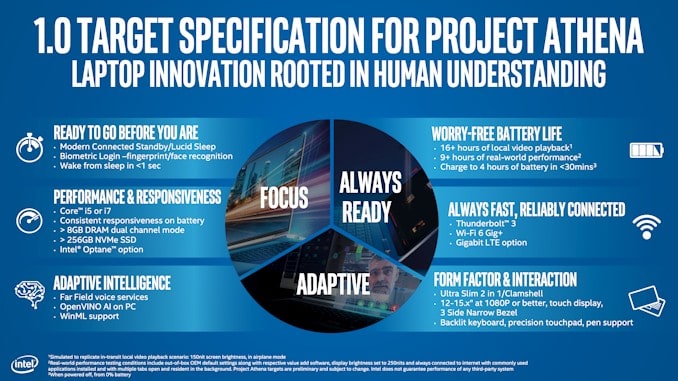
Intel’s announced that it has certified 25 products in the past year, and aims to double that number by the end of 2020.
Lots off foldable screens
And so Intel decided to invite some of the largest OEM to present their “Project Athena” certified products. Needless to say that this was relatively boring and looked more like an effort coming from Intel to fill key-note time and camouflage the fact that it has nothing much for us this year.
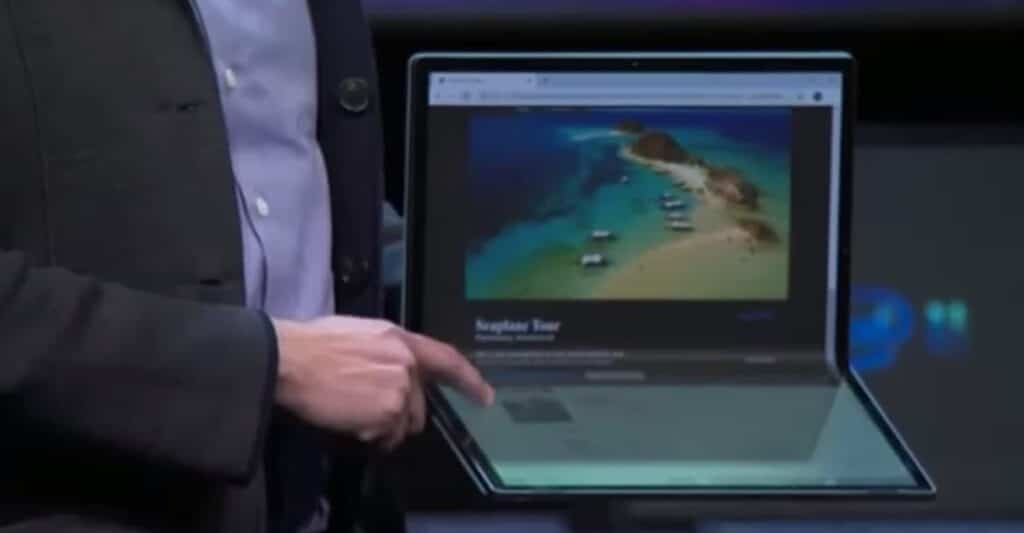
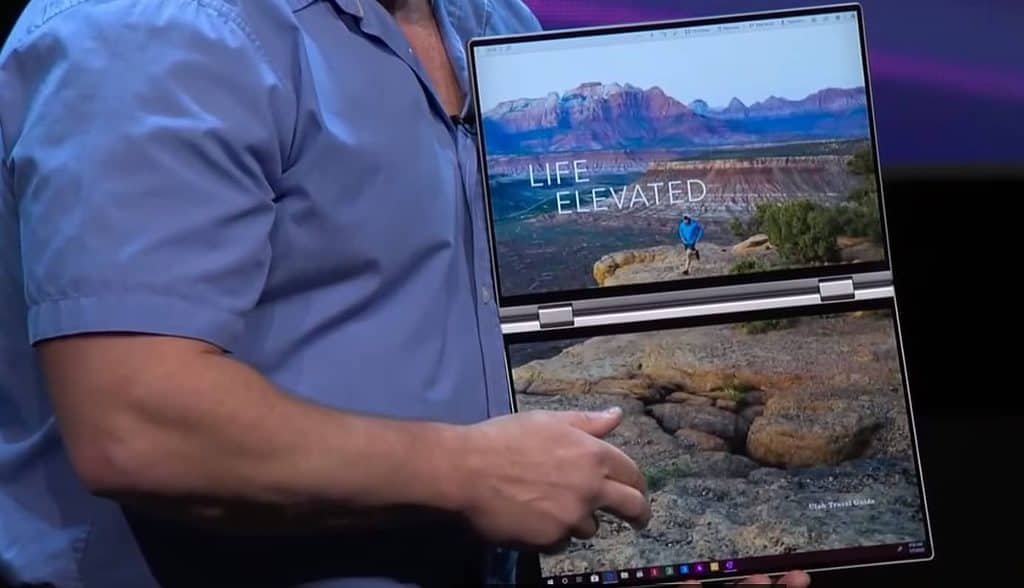
AI
That was somewhat of an entertaining presentation. Briant invited Adobe’s very own and capillary sulfurous Jason Levine to demo some of Adobe abilities to harness and make use of the 10th Gen AI abilities. And indeed it was somewhat impressive.
Jason made sure to make Adobe look easy and fun to use, adding some funny “boom” noises whenever he managed to do what he intended to do.
This character directly taken out of Zoolander does not fail to entertain, and even amuse at times.

But showing Adobe’s abilities to precisely change background behind a bird, without showing the same effects when ran on an AMD CPU is somewhat useless if not deceptive.
Tiger Lake
Well finally something almost exciting. The next gen. 10nm (hopefully) intel CPU is on stage.
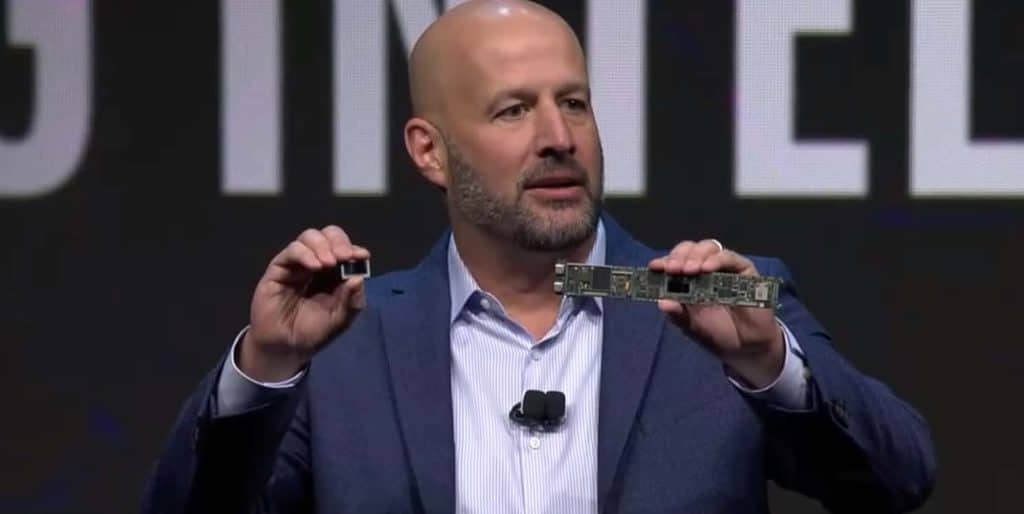
Well almost, because apart what Briant holds in his hands and a very furtive laptop based demo, we know closed to nothing about Tiger Lake.
We know that the integrated graphic will depart from the usual UHD Graphics engine and will instead have the brand new and endlessly teased-about Xe core.
Other than that… nothing, nothing, NOTHING
DG1
At the end of the presentation, Briant and Lisa Pearce showed off what Intel’s very first Xe based graphics card, codenamed DG1, could actually do on a “proof of life” demo.
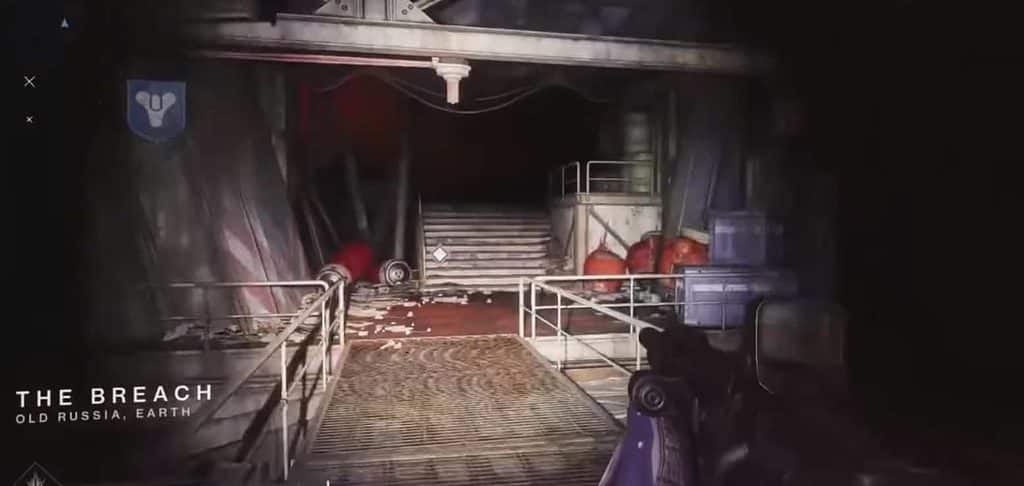
We could see Destiny 2 running rather smoothly but in the absence of details (config, resolution, FPS, etc… ) it really says nothing other than “it looks good from a afar, and as long as you don’t look at it too closely”.
In short, not Intel’s finest CES for sure.

